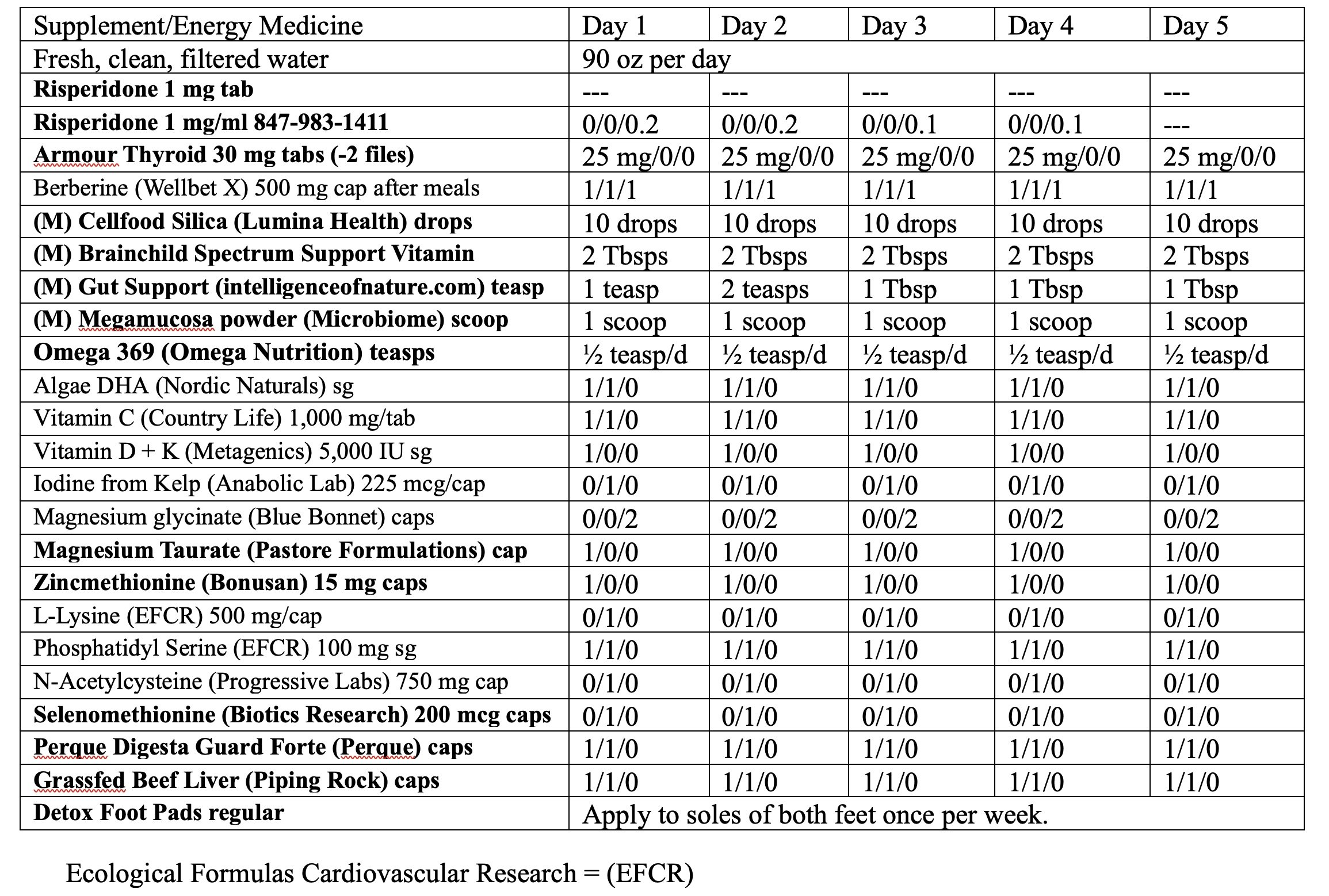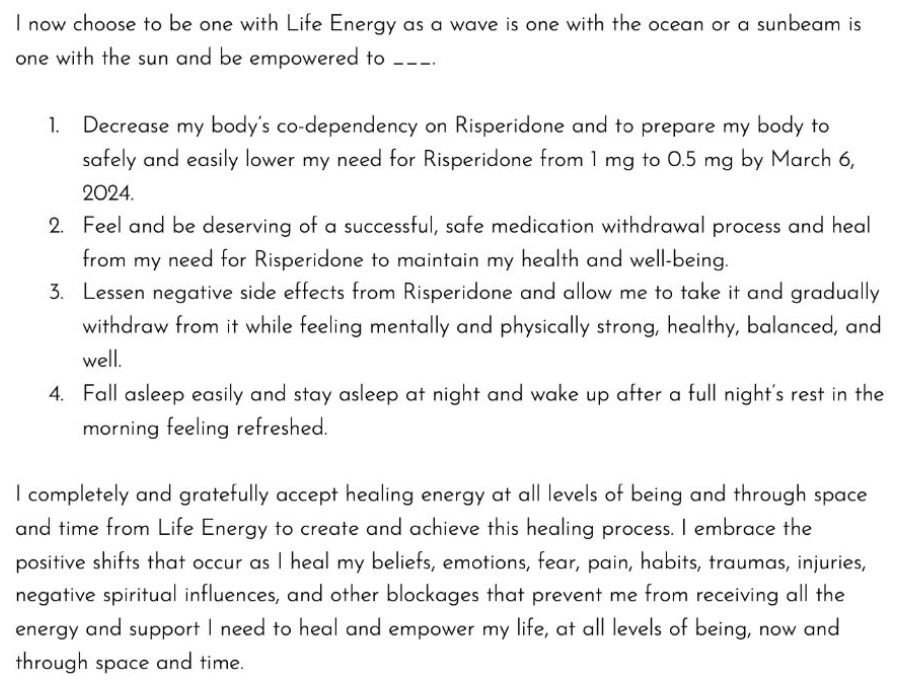Understanding and Resolving
a Common Problem
Thursday, March 14, 2024
Issue #227
During my practice as a psychiatrist, I've encountered a common problem: patients on antipsychotics with a history of heavy marijuana (MJ)/Cannabis use (1). In fact, I am currently working with someone with a history of heavy MJ/Cannabis use who became psychotic, was prescribed the antipsychotic, Risperidone, and I'm helping her taper off this medication successfully and safely.
There are many underlying causes of psychosis; exposure to MJ/Cannabis or abrupt withdrawal from MJ/Cannabis are just two causes of many.
Read on to understand the connection between MJ/Cannabis use and psychotic disorder (2,3). I've included an example of a supplement regimen used during a patient's Risperidone withdrawal and a useful podcast recording to help heal the Endocannabinoid System (ECS) (4).
Have a gorgeous week! I hope you'll soon enjoy seeing some daffodils in your neighborhood!
A common path from marijuana (MJ)/Cannabis use to being prescribed an antipsychotic generally proceeds like this:
occasional use of MJ/Cannabis for relaxation in social settings during adolescence.
MJ/Cannabis use increases to several times a day, is used alone, and is necessary for sleep onset or management of anxiety.
Increased anxiety associated with MJ/Cannabis use which develops into significant paranoia and delusions.
Abrupt cessation of MJ/Cannabis to avoid negative side effects or for other reasons such as travel abroad (5).
Withdrawal from MJ/Cannabis ensues with increased insomnia, paranoia, delusions, and psychosis. This can happen within a week of abrupt withdrawal from MJ/Cannabis. The use of CBD/THC for withdrawal only worsens negative symptoms.
Admission to a psychiatric hospital and prescribed an antipsychotic for psychosis. Currently, there is no consensus on psychopharmacological treatment of cannabis-induced psychosis (6).
Remains on the antipsychotic indefinitely or repeated cycles of inappropriate withdrawal attempts from the antipsychotic leading to psychotic relapses.
Why does this happen?
Dependency on MJ/Cannabis may initially be motivated by underlying causes for anxiety. These underlying causes may often be due to inherited difficulty with detoxification or other enzymatic deficiencies.
As toxins build up, so do symptoms typical of anxiety, such as insomnia, obsessive/intrusive thoughts, isolation, or panic attacks. Infections and poor gastrointestinal function may also contribute to underlying causes of inflammation and oxidative stress, which may also create anxiety.
When MJ/Cannabis is introduced, the initial sudden drop in anxiety hooks the person to adopt a shortcut for proper sleep, calmness, relaxation, and insight. Over time, repeated daily use of MJ/Cannabis creates the following consequences that backfire:
The person's body makes less bioidentical endocannabinoids and relies on a steady supply of exogenous forms of cannabinoids that are foreign in nature (xenobiotic sources like MJ or CBD oil).
The use of xenobiotic sources of cannabinoids either CBD/THC or MJ leads to an immune reaction to these substances, increasing inflammation and oxidative stress every time these foreign substances are introduced. This hypersensitivity reaction is common with any xenobiotic.
The immune reaction to these substances may generalize over time to have a direct impact on the innate ECS (4), creating an autoimmune, hypersensitivity reaction to the person's own ECS. The innate ECS does not have the same biochemical structure as cannabinoids from MJ and CBD/THC compounds, a fact that is often overlooked.
In time, on or off MJ or CBD/THC, the individual becomes shackled to the opposite (hypersensitivity to/withdrawal from) effects of MJ/Cannabis use: increased insomnia, anxiety, paranoia, and delusions (less insight).
The reason is that the person's ECS has been harmed by the introduction of a foreign substitute such as MJ/Cannabis that partially replaced the innate ECS and an immune system that became hypersensitized to MJ/Cannabis and/or the innate ECS.
How Do You Resolve This Problem?
To undo the damaging effects, energy medicine approaches are critical to the recovery process. Effective energy medicine heals at the level of consciousness, information, thought, and energy. It can be applied to the DNA, neurotransmitters, and the immune system to re-inform these systems. This is done through consciousness, words, thoughts, intentions, and most importantly, connection to an ideal source of energy.
Orthomolecular/functional/nutritional interventions can also enhance the recovery process by providing the biological building blocks necessary to carry out the information provided to the body through energy medicine.
Here is an example of a nutritional regimen that my patient currently takes. It provides the unique nutritional support she needs to address her genetic issues and support stress resilience (items in bold emphasize changes in her regimen when it was created):
Every person's regimen is uniquely created to fit their needs over the course of treatment. This patient was on Risperidone 2 mg at bedtime when she began working with me. She is currently on her way to stopping her medication after starting her nutritional regimen on February 7, 2024 and has not experienced any withdrawal problems. She continues to sleep through the night for 9 or more hours. Her mood is calm and her obsessive thoughts continue to resolve.
The ideal regimen will cover eight areas: vitamins, minerals, essential fatty acids, amino acids, antioxidants, anti-inflammatories, Gastrointestinal support, and detoxification.
To support her antipsychotic withdrawal, energy work using Empower Energy Technique (EET) was added to reinforce physical adaptation as she lowered her Risperidone.
For restoring her ECS, a meditative technique using energy and intentions was introduced during the session.
I've included a recording of a meditative technique that supports healing the ECS below. It can be listened to repeatedly to help reinforce its healing effects.
Between the nutritional supports, EET, and healing intentions, this patient has been able to come off her Risperidone with improved cognition, mood, and calmness. Her sleep has increased, which allows reductions of her antipsychotic medication to proceed with ease.
Without nutritional and energy medicine supports, patients often encounter more insomnia, anxiety, and poor appetite during an antipsychotic taper, no matter how "slowly" they try to do the taper.
I hope that this information will be helpful to you and that you will share it with those who are looking for ways to help themselves heal from cannabis-induced psychotic disorders and antipsychotic withdrawal.
Have a peaceful, happy week.
References:
1. Hall WD, Degenhardt L. Cannabinoid use and the risk of developing a psychotic disorder. World Psychiatry. 2008 Jun; 7(2): 68–71.
2. Degenhardt L, Hall WD. The association between psychosis and problematical drug use among Australian adults: findings from the National Survey of Mental Health and Well-being. Psychol Med. 2001;31:659–668. [PubMed] [Google Scholar]
3. Cohen M, Klein DF. Drug abuse in a young psychiatric population. Am J Orthopsychiatry. 1970;1970:448-455. [PubMed] [Google Scholar]
4. Renzende B, Alencar NKN, Freitas de Bem G, Fontes-Dantas FL, Montes GC. The Endocannabinoid System: Chemical Characteristics and Biological Activity. Pharmaceuticals (Basel). 2023 Feb; 16(2): 148. Published online 2023 Jan 19. doi: 10.3390/ph16020148
5. Ramos B, Martins AFS, Osório ESL. Psychotic Cannabis Withdrawal: A Clinical Case. Cureus. 2022 Nov; 14(11): e31465. Published online 2022 Nov 13. doi: 10.7759/cureus.31465
6. Connor JP, Stjepanović D, Budney AJ, Le Foll, Hall WD. Clinical management of cannabis withdrawal. Addiction. 2022 Jul; 117(7): 2075–2095. Published online 2022 Jan 10. doi: 10.1111/add.15743
Click on the photo above for the teaser
Click here to listen to the full episode
Be sure to subscribe!
Building well-being from the thought up may be a novel idea, but as a holistic clinician, I've found the approach very versatile and helpful--not just in terms of psychotherapeutic benefits but as a way to support the physical healing process.
This podcast provides a tool to help those whose endocannabinoid system (ECS) had been undermined by repeated exposure to marijuana or CBD/THC compounds. None of these products provide bioidentical cannabinoids and may undermine the body's production of innate endocannabinoids and initiate the immune system's hypersensitivity (inflammatory reaction) to exogenous cannabinoids and the ECS.
If the ECS is damaged, people may experience paranoia, delusions, and insomnia. If the person then stops using marijuana or CBD/THC abruptly, withdrawals may also lead to paranoia, delusions, and insomnia as well.
This situation often ends with a prescription for an antipsychotic medication to resolve cannabis-induced psychosis.
To assist those who become psychotic from exposure to marijuana/cannabis, I've had success using orthomolecular/functional medicine/nutritional supports and energy medicine techniques, which use thoughts to connect to an idealized source of energy and direct them through intentions and words to facilitate specific healing processes. As the ECS recovers, the antipsychotic medication can be gradually and safely lowered (with nutritional supplement support).
This recording directs your thoughts and intentions for the specific purpose of healing the ECS. I am using it to help my patients in my practice to lower their antipsychotic medications that were a necessary treatment for cannabis-induced/withdrawal psychosis. I hope you'll find it helpful or share it with someone who might benefit from it.
For more about Dr. Alice W. Lee, please visit:
Podcasts: Click here to listen to all of The Holistic Psychiatrist Podcast episodes. If you like this podcast, please give it a 5-star rating and share this with others! Thank you!
YouTube: The Holistic Psychiatrist
To schedule consultations or appointments, call Dr. Lee's office at 240-437-7600
Dr. Lee has office locations in Lehi, Utah, and Yonkers, New York. I am currently practicing out of Lehi, Utah.
Copyright © 2024 Alice W. Lee, MD, ABIHM, ABoIM – Holistic & Integrative Psychiatrist in Lehi, Utah. All rights reserved.
The content provided by this podcast is for informational purposes only and has not been approved by the U.S. FDA. This podcast is not intended to provide personal medical advice, which should be obtained from a medical professional.
26th International Energy Psychology Conference
May 30th to June 3, 2024
Litchfield, AZ (Phoenix), Wigwam Resort
Dive into Tranquility: Your Desert Oasis Awaits
Recharge and strengthen your inner light
You take care of others all year long. And with the increased stress, anxiety and more during the past few years, your work has never been more important. And frankly, it’s more crucial than ever that you keep your energy and vibration elevated during these difficult times so you can be there for others.
Your sanctuary awaits at the 26th International Energy Psychology Conference, offering a transformative learning experience that captivates your heart, mind, and soul. Immerse yourself in the beautiful energy of a larger community that embraces you.
I'm honored to be presenting at this conference and can tell you that it truly is a transformative, nourishing experience.
My colleagues at the Association for Comprehensive Energy Psychology (ACEP) have crafted this experience with meticulous care – handpicking inspiring speakers with cutting-edge insights, infusing soul-stirring music, welcoming you with open hearts, and more. You'll depart not just rested and renewed but with a toolkit of new methods to aid your clients on their healing journey.
Relax in your private casita or on an outside patio, savoring the beauty of this desert oasis. Join the gathering for a complimentary lunch, explore the vibrant exhibit hall, engage in movement energizers, and more.
🌟 What You Get
5 Keynotes
4 Invited Presentations
7 Learning Labs (including a new experiential track - Transformative Journeys)
Movement energizers
Life-changing encounters
Pre-conference intensive (additional fee, 6 choices)
Post-conference intensive (additional fee, 4 choices)
Free admission to the 2024 Energy Psychology Research Symposium on May 30.
Up to 30 CE/CNE and up to 23 CE for psychologists
A retreat at the stunning Wigwam Resort - almost the whole place to ourselves
Bask in the beautiful energy field we create together
🌐 Learn all the details and secure your Aahhh: Conference Details and Registration.
🌅 Early bird prices end April 8 and you'll save up to $200. Don't miss this chance to let ACEP and your community take care of you, and help you recharge and renew.
If you have questions or need assistance, please reach out to Leslie Primavera at admin@energypsych.org or call 619-861-2237.
P.S. With fantastic pre- and post-conference events, earn up to 30 CE/CNE credits (up to 23 CE for psychologists) for free, alongside all the other rejuvenating benefits! Register Now!






